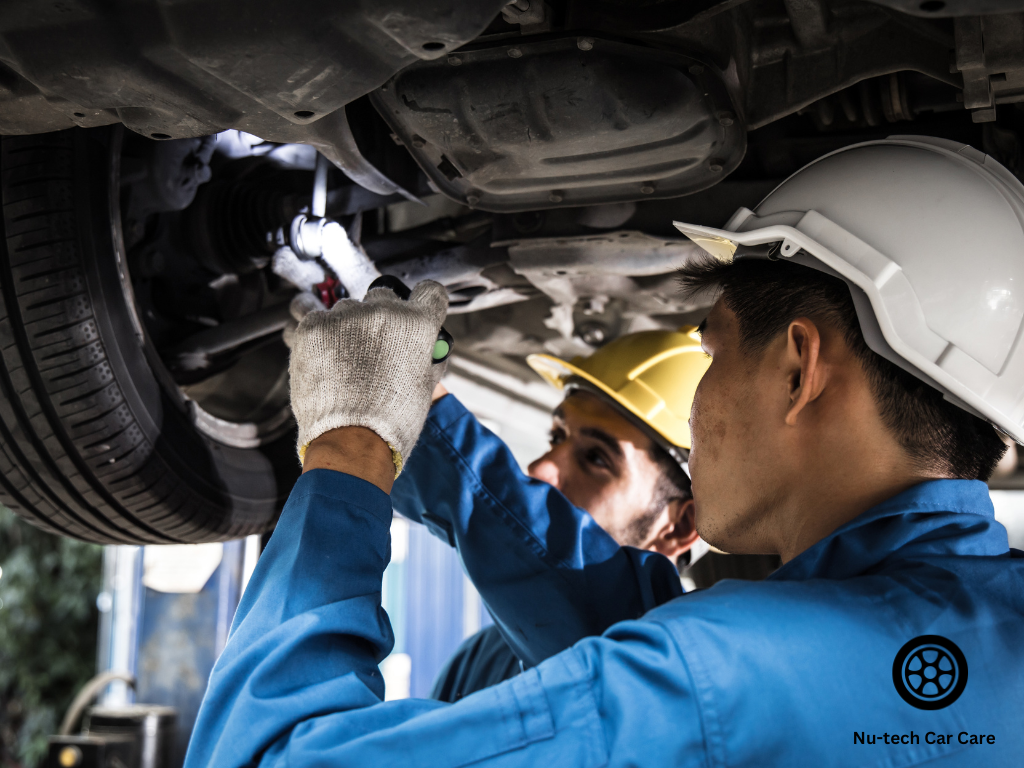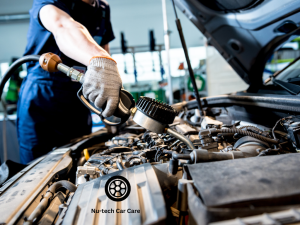Have you ever wondered how cars manage to provide a smooth ride, even on bumpy roads? The secret lies in the suspension system, an unsung hero of modern vehicles. This intricate system cushions us from the harsh realities of the road, making our journeys more comfortable and safer. Let’s delve into the fascinating world of car suspension and discover its significance in daily car service and repair.
The Basics of Car Suspension
Simply put, the suspension system in a vehicle ensures that the car’s body remains stable while its wheels navigate uneven terrains. In other words, while the wheels adjust to the road’s ups and downs, the car’s body, where passengers sit, remains relatively steady. This is vital not just for comfort, but also for safety. After all, a car that bounces uncontrollably would be challenging to steer.
Interestingly, the concept of suspension isn’t new. Historically, even horse-drawn carriages had basic suspension systems. Over the years, these systems have evolved dramatically, thanks to technological advancements and our deeper understanding of physics.
Linking Suspension to Other Car Systems
The suspension system doesn’t work in isolation. It’s intricately connected to various other systems in a car. For instance, during a car service, mechanics will often examine both the suspension and the cooling system services. Why? Because if the suspension system is compromised, it can lead to additional stress on the engine, causing it to overheat.
Moreover, the clutch and brake system’s efficiency is also tied to the suspension’s performance. With a faulty suspension, the brakes might have to work harder, potentially leading to premature wear. The next time you go for a rego check or a safety check, remember that a well-maintained suspension system plays a crucial role in ensuring your car’s overall health.
Common Suspension Issues and Their Solutions
While regular car repair and car maintenance can prolong the life of your suspension system, it’s not immune to issues. Some common problems include worn-out shock absorbers, damaged springs, and imbalanced tires. These issues can affect ride comfort, tire life, and even fuel efficiency.
If you’ve ever had a car battery replacement, you’ll understand the importance of timely intervention. Similarly, addressing suspension issues early can prevent more significant problems in the future. Regular tyre services can also help in identifying and fixing suspension-related problems, as uneven tire wear often signals suspension troubles.
Understanding Your Vehicle’s Suspension: Common Queries
Car suspension, while essential for a smooth and safe ride, can often seem a bit complicated to the uninitiated. At Nu-tech Car Care, we consistently encounter certain questions from vehicle owners keen to understand this critical system better. Let’s explore these queries in greater detail:
How often should I get my car’s suspension system checked during routine car service?
Regular checks of your suspension system are crucial. While general guidance recommends inspecting the suspension at least once a year, several factors can influence this. For vehicles frequently driven on rough or uneven terrains, more frequent checks might be necessary. Overlooking this can lead to decreased ride comfort and potential safety hazards. During routine car service at Nu-tech Car Care, our technicians always look out for signs of suspension wear.
Can uneven or worn-out tires damage the suspension, or is it the other way around?
The relationship between tires and suspension is symbiotic. Uneven or worn-out tires can put additional strain on the suspension system, causing premature wear. Conversely, a compromised suspension system can lead to uneven tire wear. Regular tire rotations and ensuring proper tire inflation can help mitigate these issues. It’s also beneficial to have both the tires and suspension inspected simultaneously to ensure both systems are in sync.
Are there any noticeable signs while driving that indicate my vehicle’s suspension system might be failing or needs attention?
Certainly, there are telltale signs. A car that feels more bouncy or sways excessively during turns may have worn-out shock absorbers or struts. Hearing noises, such as clunks or squeaks, especially over bumps or during turns, is another sign. Additionally, if you notice your car is sagging or sitting lower on one side, it’s a clear indicator that the suspension needs a check. During a visual inspection, if the shock absorbers or struts seem oily or greasy, they might be leaking and need replacement.
Conclusion
In the vast world of car maintenance, it’s easy to overlook the importance of the suspension system. However, as we’ve seen, it plays a pivotal role in ensuring a comfortable and safe ride. By prioritizing regular car service, we can ensure our vehicle’s suspension system remains in top shape, ready to cushion our journeys for many miles to come.
Your car’s suspension system not only ensures a smooth ride but also affects handling and safety. At Nu-tech Car Care, we encourage every vehicle owner to prioritize understanding their vehicle’s suspension, as it can have far-reaching implications on overall car health and driving experience.










